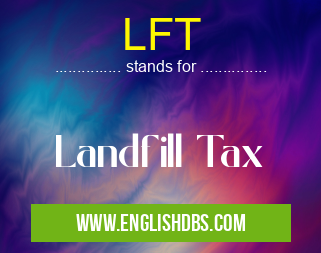What does LFT mean in WASTE MANAGMENT
Landfill Tax, also known as LFT, is a tax imposed on the disposal of certain types of waste to landfill. This environmental levy was introduced in 1996 and has been instrumental in reducing the amount of waste sent to landfill in the UK. Landfill Tax is an important revenue-generating tool for the government, with all monies raised from it going straight into Treasury coffers. While LFT can be seen as an environmental burden at times, its purpose is to encourage more environmentally responsible forms of waste management such as reuse and recycling.

LFT meaning in Waste Managment in Community
LFT mostly used in an acronym Waste Managment in Category Community that means Landfill Tax
Shorthand: LFT,
Full Form: Landfill Tax
For more information of "Landfill Tax", see the section below.
Essential Questions and Answers on Landfill Tax in "COMMUNITY»WASTE"
What is Landfill Tax?
Landfill Tax is a type of environmental tax placed on businesses and organisations that send waste to landfill. The levy was initially introduced in the UK in 1996 as a way of incentivising companies and organisations to recycle more and look for alternative options rather than dumping their waste.
How much does Landfill Tax cost?
The level of Landfill Tax charged depends on the amount and type of material sent to landfill. As of April 2021, the rate for standard non-hazardous material was set at £94.15 per tonne whilst hazardous material such as asbestos could be subject to a higher rate equivalent to £171.45 per tonne.
Who pays Landfill Tax?
Businesses, local authorities or other organisations that send waste materials to landfill sites are liable for payment of landfill tax. In some cases, individuals may also be required to pay the tax if they dispose of commercial grade waste themselves.
How often do I need to pay Landfill Tax?
The rate of taxation is set on an annual basis with payments due at the start of each financial year. For example, in 2021/22 all landfill sites must pay the applicable rate stated above at the beginning of April 2021.
Is there any way around paying Landfill Tax?
There are certain exemptions from paying landfill tax such as when wastes are sent abroad for disposal or when they are recovered rather than disposed off. Companies should seek professional advice if they believe they may qualify for any exemptions from paying landfill tax.
Are there any penalties for not paying Landfill Tax?
Yes, failure to pay or report cases which require payment will result in penalties being applied. These can range from fines and surcharges up to potential criminal proceedings depending on the circumstances surrounding non-compliance with payment requirements.
Can I reclaim any overpaid Landfill Tax?
Yes, businesses can apply for a refund or adjustment from HMRC if it can be demonstrated that too much has been paid over a certain period based upon records kept by operators. Further information on how this process works can be obtained from either your accountant or HMRC directly.
Is it possible to transfer liability for Landfill Tax?
Yes, liability for payment may be transferred between parties subject to agreement between both parties involved and confirmation from HMRC that liability has been transferred successfully between them.
What happens if I don't know who pays my company's Landfill Tax bill?
If you aren’t sure who is liable then you should contact your accountant or HMRC who will be able provide support and put you in touch with administrators that manage this process.
Final Words:
The Landfill Tax (LFT) was introduced as an effective way for the government to manage disposable waste levels in order to protect both human health and our environment; it also generates valuable revenue for Treasury funds at the same time. Although it presents some financial burden on businesses dealing with large amounts of certain types of waste materials, its benefits far outweigh any negatives when looked at through a wider perspective; businesses can save money by avoiding costly taxes associated with disposing such items while local communities benefit from cleaner air quality and healthier soils due to increased reuse/recycling practices within areas that must pay these levies.
LFT also stands for: |
|
| All stands for LFT |
